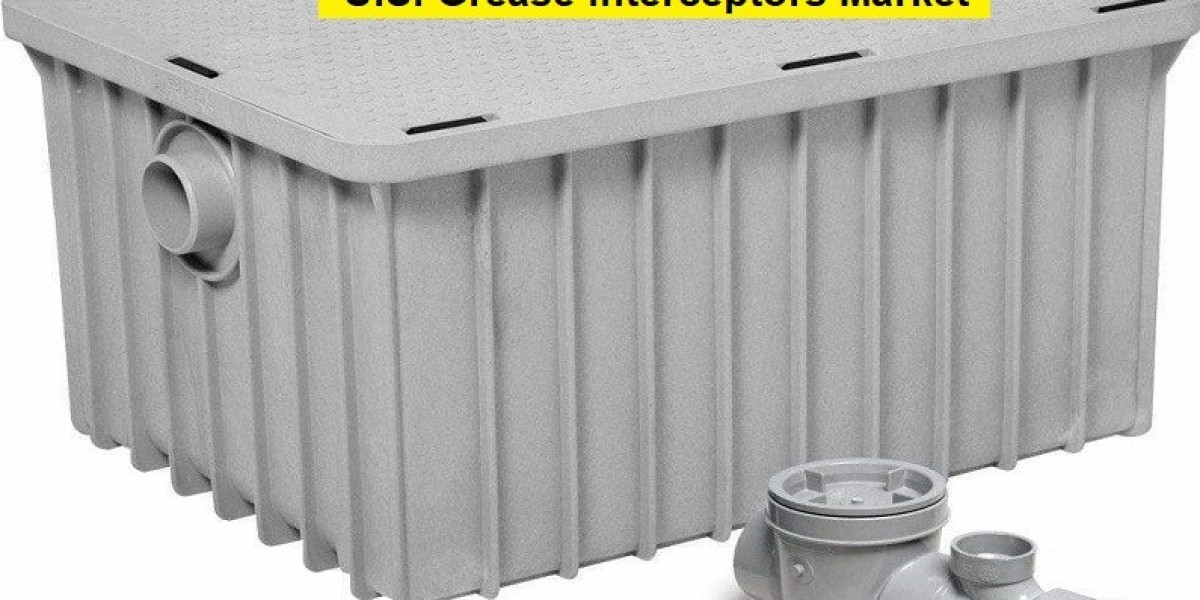The U.S. Grease Interceptors Market size, valued at USD 917.85 Million in 2023, is expected to witness robust growth, reaching USD 1,987.72 Million by 2031, with a projected compound annual growth rate (CAGR) of 9.96% from 2024 to 2031. The market expansion is being driven by the growing food service industry and stringent regulatory compliance aimed at managing fats, oils, and grease (FOG) in wastewater systems. With increasing awareness about environmental sustainability and wastewater management, the demand for grease interceptors is on the rise across the U.S.
Grease interceptors, commonly known as grease traps, are essential devices used to separate and capture fats, oils, and grease from wastewater, preventing them from entering municipal sewer systems. These devices are crucial for restaurants, commercial kitchens, and food processing facilities. Regulatory bodies such as the Environmental Protection Agency (EPA) are enforcing stricter laws to mitigate sewer blockages and reduce environmental pollution caused by FOG. As a result, the adoption of grease interceptors has become a priority, especially for food service businesses across the country.
Grease interceptors help in reducing the environmental impact of FOG, protecting water bodies from contamination, and preventing blockages in wastewater systems. Their importance is amplified by the fact that local plumbing codes often mandate their use to ensure compliance with environmental standards. Proper installation, regular maintenance, and timely cleaning are critical for their efficient functioning, making grease interceptors indispensable in modern commercial setups.
Download Full PDF Sample Copy of Research Report @ https://www.verifiedmarketresearch.com/download-sample/?rid=431007
U.S. Grease Interceptors Market Segmentation Analysis
By Product
- Hydromechanical Grease Interceptor (HGI)
- Gravity Grease Interceptor (GGI)
Hydromechanical Grease Interceptors (HGIs) dominated the market in 2023, accounting for 76.90% of the market share with a value of USD 705.87 Million. HGIs, which operate using gravity separation and vented flow control, are commonly installed indoors and handle kitchen wastewater efficiently. They are expected to continue leading the market with a projected CAGR of 10.37%. In contrast, Gravity Grease Interceptors (GGIs) captured the remaining share, valued at USD 211.98 Million in 2023, and are projected to grow at a CAGR of 8.50%.
HGIs are especially beneficial in preventing grease-related sewer clogs in commercial kitchens, ensuring compliance with local regulations, and supporting sustainability goals. Their effectiveness in capturing FOG makes them a preferred choice in the food service industry.
By Application
- Restaurants
- Supermarkets
- Home
- Others
Restaurants held the largest market share in 2023, contributing USD 818.77 Million (89.20% of the market) and are projected to grow at a CAGR of 9.87% during the forecast period. Supermarkets were the second-largest segment, valued at USD 25.58 Million, with an anticipated growth rate of 11.24%. The "Home" segment, although smaller, is expected to grow the fastest, at a CAGR of 11.47%.
Grease interceptors are particularly crucial for restaurants, where large quantities of FOG are generated. These devices not only help restaurants comply with health and safety regulations but also reduce the risk of blockages and costly repairs, ensuring smooth operations.
By Capacity
- 150 – 499 Gallons
- 500 – 999 Gallons
- 1000 – 1499 Gallons
- 1500 – 1999 Gallons
- 2000+ Gallons
The 150 – 499 Gallons segment dominated the market in 2023, accounting for 53.49% of the market share with a value of USD 490.93 Million. This segment is expected to grow at a CAGR of 9.97%. Grease interceptors with a capacity of 500 – 999 Gallons followed, valued at USD 215.21 Million, and are projected to grow at the highest CAGR of 11.18%.
Medium-sized food service establishments are the primary consumers of grease interceptors in this capacity range. These systems provide efficient FOG management and help businesses avoid environmental penalties and costly sewer repairs.
Regional Insights
- California
- Texas
- New York
- Florida
- Pennsylvania
California leads the U.S. Grease Interceptors Market, accounting for 12.22% of the market share in 2023, with 51,743 units sold. The state's market is projected to grow at a CAGR of 9.03%. Texas follows closely with a market volume of 34,035 units and a CAGR of 8.98%. Georgia is expected to see the fastest growth, with a CAGR of 10.37%.
Competitive Landscape
Key players in the U.S. Grease Interceptors Market include Watts (Dormont, Josam), Rexnord (Zurn), Rockford Separators, Drain-Net, Jensen Precast, Jay R Smith, Thermaco, Ashland PolyTrap, Endura (Canplas), and Grease Guardian (F.M. Environmental Group Ltd). These companies are involved in extensive product development, partnerships, and market expansion efforts. The market is highly competitive, with players focusing on improving product efficiency and complying with stringent regulations.
The ACE Matrix ranks the key players based on factors like innovation, scalability, industry reach, and growth roadmap. The top players consistently focus on enhancing product features, service offerings, and expanding their regional footprint.
To Purchase a Comprehensive Report Analysis @ https://www.verifiedmarketresearch.com/select-licence/?rid=431007
Market Dynamics and Growth Drivers
The growth of the U.S. Grease Interceptors Market is fueled by several key factors:
- Stringent Regulatory Requirements: Increasing environmental regulations mandate the installation of grease interceptors in commercial kitchens to prevent sewer blockages and environmental degradation.
- Growing Food Service Industry: The expansion of restaurants and food processing units is driving demand for efficient grease management systems.
- Technological Advancements: Innovations in interceptor technology, including more efficient and user-friendly models, are enhancing market growth.
- Environmental Awareness: Rising public concern about sustainability and wastewater management is encouraging businesses to adopt effective grease interception solutions.
Conclusion
The U.S. Grease Interceptors Market is set to experience significant growth in the coming years, driven by regulatory requirements, the expanding food service sector, and advancements in grease management technology. With increasing awareness about environmental protection, the market is expected to continue its upward trajectory, providing ample opportunities for businesses to invest in and adopt innovative grease management solutions.



